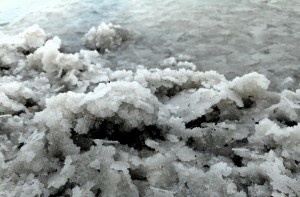Salt (afrina, afralato or afralatso)
The salt produced in Mani is renowned for its aroma and its taste of the sea.
The need for food preservation necessitated the use of salt as there were no other means of preserving food. Salt production was also an addition to family income which otherwise came mainly from agriculture and stock raising.
In Mani, people used curing (salting in brine) to keep foods such as pork (syglino), fish (chapsi) and quail intact. Quail and other domestic poultry, eggs, olives, cheese and dough for baking were also preserved in salt. The salt fields that belong to the territory of Eastern Mani Municipality are mainly located in Mesa and Aposkieri Mani, while a small number of them are found in Prosiliaki Mani. The two main reasons that favoured the development of salt production in Mani were the favourable climate along with the topography and the geology of coastal areas.
Salt production flourished in Mani in late 19th and early 20th centuries. At the time, a big demographic growth took place in the region. The increased demand for salt to meet the residents’ needs resulted in more and more people becoming involved in the production and transportation of salt. At that time, salt, among other goods, was a state monopoly and a significant source of national income. Citizens could legally buy salt produced at the large state-owned salt fields in Messolonghi, Attiki or Lamia, that reached Mani by boat from Messolonghi and was sold only at special state-run stations. Locals called this salt karavalatso (salt arriving by boat), wanting to distinguish it from the salt produced in Mani which they called afralatso (salt coming from the sea foam).
It is understood that, at the time, the production and transportation of salt was illegal and a smuggling activity. According to local witnesses, gendarmes often destroyed salt fields throwing oil on them. Salt producers used the word “gnosi” (knowledge) when they referred to afralatso, as a signal, in order to protect their salt fields from government officials.
Did you know that…?
Salt is a natural food preservative containing over 91 minerals. It is also an amazing source of trace elements that are essential for the proper functioning of our bodies!!!
In Roman times, precious salt, “sal” in Latin, was a means of payment to soldiers. The pricey legionaries of the Roman Empire received part of their payment in salt.
It is the Latin word “sal” that the English word “salary” is derived from. Such was the value of salt that it was used as a medium of transaction.
According to ancient Greeks, it symbolizes friendship and solidarity.
In the New Testament it says: “Ye are the salt of the earth”.
Well known expressions and proverbs
“Don’t pour salt on my wound”: we say this when someone reminds us of things that hurt us in the past.
“A salt agreement”: a phrase used to describe a continuing friendship between citizens and states.
“We had bread and salt together”: a phrase used to describe a warm friendship.
“Don’t throw salt on other people’s food”: we say this when we want to tell someone to mind their own business.
“Pillar of salt”: we use this phrase metaphorically for someone who is completely motionless out of surprise or consternation. This phrase comes from the biblical narrative about Lot’s wife, who turned into a pillar of salt when she turned back to see Sodom on fire: “But his wife looked back from behind him, and she became a pillar of salt”. Genesis, 19.26


